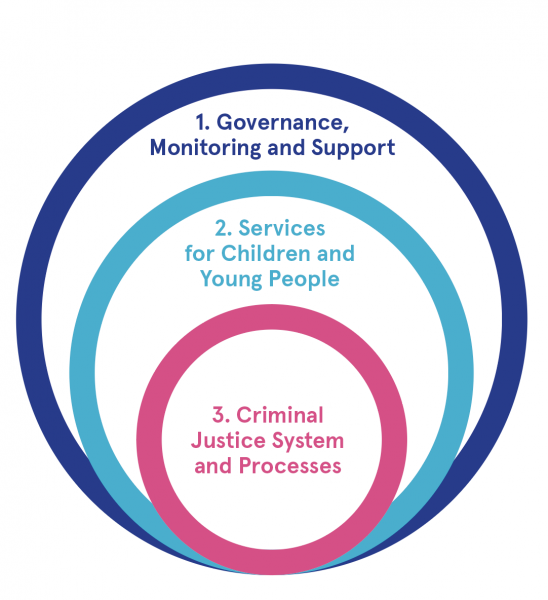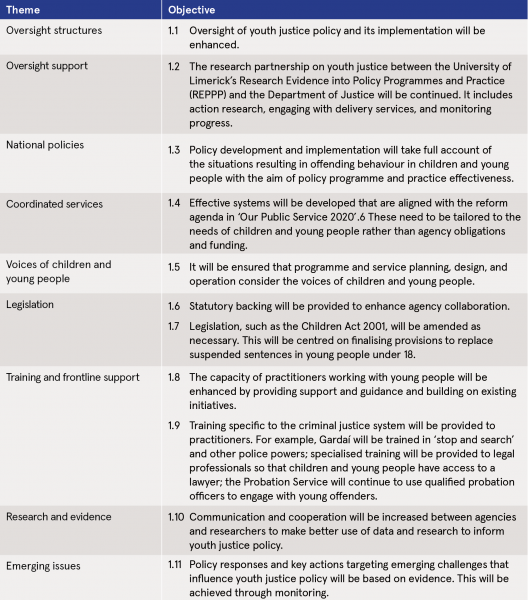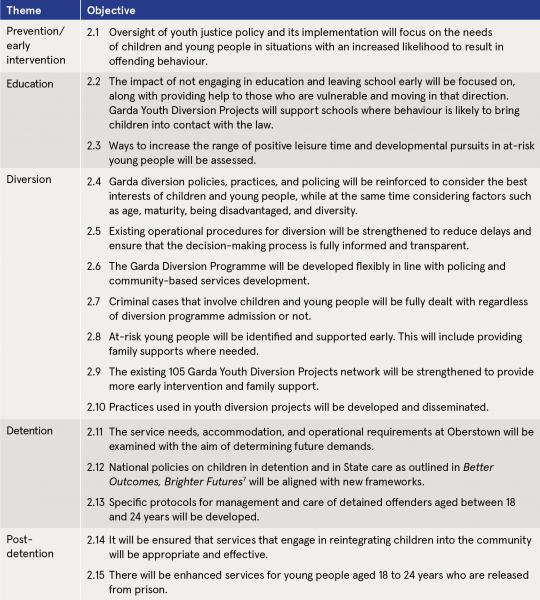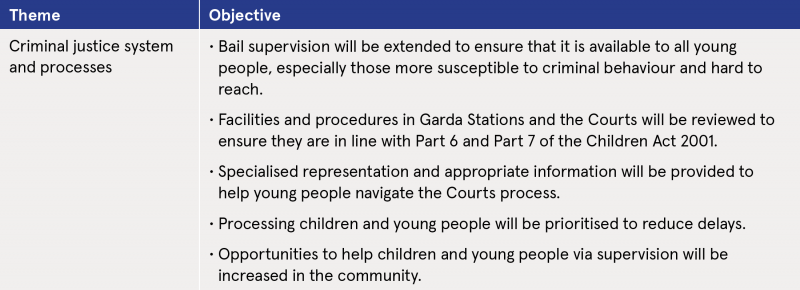Guiney, Ciara (2021) Youth Justice Strategy 2021–2027. Drugnet Ireland, Issue 79, Autumn 2021, pp. 10-14.
| Preview | Title | Contact |
|---|---|---|
|
PDF (Drugnet Ireland 79)
1MB |
On 15 April 2021, Minister of State for Law Reform James Browne TD and Minister for Justice Helen McEntee TD launched a new Youth Justice Strategy 2021–2027.1,2 It is centred on a developmental framework that aims to target ongoing and emerging challenges in youth justice.2 A key strength of this strategy is that its development was informed by an expert steering group representing key stakeholders, such as the Department of Justice; Department of Health; Department of Children, Equality, Disability, Integration and Youth; the Probation Service; An Garda Síochána; Oberstown Children Detention Campus; Department of Education and Skills; Tusla; University College Cork (UCC); University of Limerick; Solas; Children’s Rights Alliance; and Foróige. The steering group was assisted by experts, Dr Louise Forde and Dr Katharina Swirak, from the UCC Centre for Children’s Rights and Family Law, who provided content and guidance from a valuable evidence base.1
Focus of strategy
Guiding principles
The strategy is grounded on principles derived from international and national legal standards related to youth justice, such as the United Nations Convention on the Rights of the Child and the European Convention on Human Rights.3,4 In a separate document, Forde (2020) provides an overview of these standards and outlines some of the main principles that emerge from them.5
Purpose, context, and scope
By using a developmental framework, it is hoped that the strategy will result in meaningful collaborative stakeholder engagement and allow for flexibility to address challenges and developments as they arise. Hence, the strategy is a living document subject to review, where progress reports will be published annually.
Youth Justice Strategy
Figure 1 shows the main themes that the strategy aims to address. The details of each will be presented separately in the article.

Source: Youth Justice Strategy 2021–2027 (p. 10) 1
Figure 1: Thematic objectives of the Youth Justice Strategy 2021–2027
Theme 1: Governance, monitoring and support
The strategy aims to deliver governance, monitoring, and support for policy implementation. The development of practice and programmes will be based on evidence. As shown in Table 1, several objectives were identified.
Theme 2: Services for children and young people
The strategy aims to provide services to children and young people who come into contact with the criminal justice system or who are in situations that may result in offending behaviour in order to help them develop and stop offending behaviours. Table 2 outlines the main themes and objectives to be addressed.
Theme 3: Criminal justice system and processes
The strategy aims to implement criminal justice processes that help children and young people stay away from offending behaviour and adopt positive life choices, while at the same time ensuring that the rights of victims are upheld. Several objectives were identified, as outlined in Table 3.
Table 1: Governance, monitoring and support objectives

Source: Youth Justice Strategy 2021–2027.1
Table 2: Services for children and young people objectives

Source: Youth Justice Strategy 2021–2027.1
Table 3: Criminal justice system and processes objectives

Source: Youth Justice Strategy 2021–2027.1
Conclusion
In launching the strategy, Minister Browne believes that it will address key ongoing challenges of youth crime as well as new and emerging issues in the youth justice area.
This strategy will respond collaboratively to the situation of vulnerable children and young people, with a strong focus on diverting them away from offending, prevention and early intervention. I can’t stress enough the importance of bringing all the relevant agencies and programmes together, and of supporting schools, to ensure that we provide a holistic, ‘wraparound’ response to the needs of children and young people at risk. (p. 2)2
The strategy was welcomed by Fíona Ní Chinnéide, executive director of the Irish Penal Reform Trust. She noted that the strategy is an opportunity to transform the lives and futures of disadvantaged children and young people in Ireland, with the emphasis on moving away from the formal justice system towards diversion as ‘of paramount importance’ (p. 1).8 She further acknowledged the importance of ensuring that the child-centred aims of the strategy are achieved with resources and wider social policy measures.
1 Department of Justice (2021) Youth justice strategy 2021–2027. Dublin: Department of Justice.
https://www.drugsandalcohol.ie/34061/
2 Department of Justice (2021) Minister Browne launches Youth Justice Strategy 2021–2027 [Press release]. 15 April 2021. Dublin: Department of Justice. Available online at:
http://www.justice.ie/en/JELR/Pages/PR21000079
3 United Nations (1989) Convention on the Rights of the Child. New York: United Nations. Available online at: https://www.ohchr.org/Documents/ProfessionalInterest/crc.pdf
4 Council of Europe (1950) European Convention for the Protection of Human Rights and Fundamental Freedoms [European Convention on Human Rights]. Rome: Council of Europe. Available online at:
https://www.echr.coe.int/documents/convention_eng.pdf
5 Forde L (2020) The international standards relating to youth justice: an overview. Cork: UCC Centre for Children’s Rights and Family Law. Available online at:
http://www.justice.ie/en/JELR/Justice_International_Standards.pdf/Files/Justice_International_Standards.pdf
6 Department of Public Expenditure and Reform (2019) Our Public Service 2020: first progress report. Dublin: Government of Ireland. Available online at:
https://www.gov.ie/en/policy-information/cc5b1f-our-public-service-2020/
7 Department of Children and Youth Affairs (2014) Better Outcomes, Brighter Futures: the national policy framework for children and young people 2014–2020. Dublin: Stationery Office.
https://www.drugsandalcohol.ie/21773/
8 Irish Penal Reform Trust (2021) Youth Justice Strategy marks an opportunity to transform the lives and futures of children facing multiple disadvantages [Press release]. 15 April 2021. Dublin: Irish Penal Reform Trust. Available online at:
https://www.iprt.ie/latest-news/youth-justice-strategy-marks-an-opportunity-to-transform-the-lives-and-futures-of-children-facing-multiple-disadvantages-iprt/
MM-MO Crime and law > Crime deterrence
MM-MO Crime and law > Justice system > Community anti-crime or assistance programme
MM-MO Crime and law > Justice system > Justice / enforcement agency
T Demographic characteristics > Adolescent / youth (teenager / young person)
VA Geographic area > Europe > Ireland
Repository Staff Only: item control page